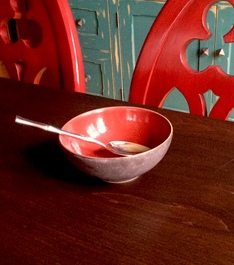The content of this post may be sensitive to some readers.
Part One: Raisin Bran and Other Painful Things
Dinner comes late in the Kelleher household. With four children, my mother is a rather busy woman, and, frankly, remembering dinner's daily occurrence isn't her forte. This story begins on one of those late-dinner nights, and I was hungry -- real hungry. The clock above the stove read seven, a time when one would expect the kitchen to be empty and dinner still stuffed in Whole Foods bags. But on this evening, I concluded that dinner's nonexistent state was a sign that we were each to prepare our own meal.
And so I reached for a deep red ceramic bowl, poured myself a small serving of Raisin Bran, and walked out of the kitchen, spooning milk and cereal into my mouth.
"What are you doing?" my mother asked from her position on the couch. "We haven't had dinner yet. I just ordered Thai."
"Oh," I responded, turning on my heel and walking back into the kitchen. "Well, I figured we were getting our own dinner. I don't want any Thai. I already ate cereal," I called over my shoulder, feeling my anxiety begin to rise.
"That little thing! Don't be silly. You had two bites. You're eating dinner."
"I can't eat, Mom. I already had dinner. I'm FULL!" I slammed the bowl into the sink, the ceramic shattering as it hit the aluminum surface. In a storm of anger, I flew down the back staircase to the basement, my fury swelling as I replayed the events in my head.
"Stop, Brittany! Stop!" my dad shouted. I turned and glared up in his direction, ready for a pitched battle. But when I looked into his familiar face and saw the concern drawn across it, my anger melted and I was overcome by a flood of emotion. I collapsed, my shoulders shaking as I began to sob silently.
This was wrong. This was all wrong. That girl backed into a tight corner, hugging her knees and burying her tear-soaked face into them was not me. I didn't know this depressed, lifeless girl whose spirit was gradually fading. My parents, who had cautiously migrated down the staircase, were now standing over me, watching, not knowing what to say. After a period of prolonged silence interspersed with my occasional gasps for air, my dad slid to the floor. "Brittany, do you want to see a doctor?"
Finally, someone asked. Finally, someone acknowledged that I had a serious problem. I nodded my head, buried it back into my knees, and sobbed some more.
I am a recovering anorexic, and this is my story. I've thought about it every day since I was 16-years-old. I've analyzed it, dug deep for its root, and cried over its reality. I've thrown things, books and pens mostly, mad that this stupid, unfair disease ruined an unrecoverable chunk of my life. I've told this story many times before, to therapists, to friends, and to my parents and siblings in piecemeal. I've shared it as encouragement for others to get help; I've nodded to it in an undergraduate speech. I've thought about this story and recanted it so many times that, to be frank, I'm tired of it. I desperately did not want to write about it again. But I must, because I have never told it honestly. I have always glossed over those aspects I am most ashamed of and constructed it as if it were a thing of the past.
But I now am healthy enough, mature enough, and, finally, courageous enough to tell this story right. I know it will leave me vulnerable, exposing the raw edges of wounds still healing. At times, it will reveal a hated side of myself that I loathe for anyone to see. But it is the truth. And it is me.
A Tale of a Recovering Anorexic is a six-part series rooted in honesty and our communal struggle with body image. It will return next Monday. In the meantime, feel free to share your own story! We've been silent for too long, but with truthful dialogue comes strength.
If you're struggling with an eating disorder, call the National Eating Disorder Association hotline at 1-800-931-2237.
